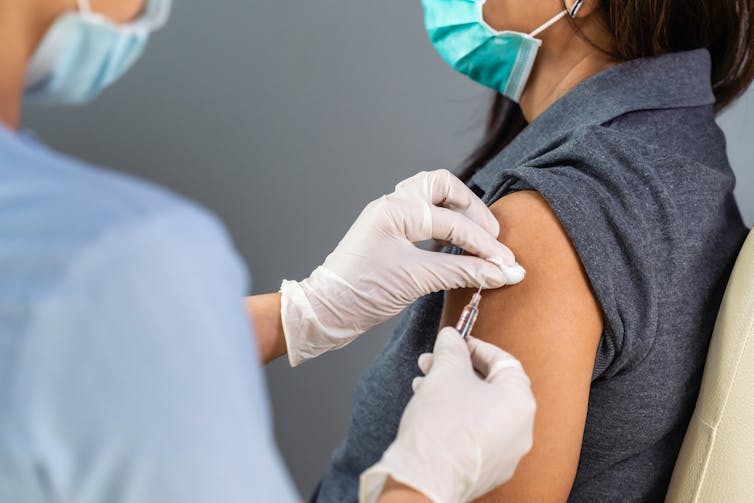If we’re ever to return to some semblance of normality, then the world’s inhabitants must be resistant to SARS-CoV-2, the virus that causes COVID-19. However with so many different vaccines in production, questions are undoubtedly going to be raised, similar to can I nonetheless have a vaccine if I’ve been concerned in trial testing different variations? And, what if I’ve already had COVID-19 – do I nonetheless want a vaccine?
A fundamental understanding of immunology can reply all these questions. All COVID-19 vaccines attempt to generate an immune response to proteins the virus must enter your cells. Whether or not that is by utilizing a innocent virus carrying the protein that mimics SARS-CoV-2 however doesn’t replicate, or by utilizing the genetic code for these proteins (a messenger RNA), the end result is identical. The protein vital to stopping SARS-CoV-2 is displayed, acknowledged by the immune system, and the physique produces antibodies and T cells which can be then able to cease future an infection.
[Learn: ]
Is it OK to have a unique second dose?
A booster vaccination enhances the standard of the immune response and sends a reminder in regards to the virus. It doesn’t matter if the vaccine used to prime the immune system is completely different from the one used to spice up, so long as they each include the vital viral protein.

Booster vaccinations are widespread, and the time interval between them varies. For instance, a booster for tetanus is suggested every ten years whereas vaccines for hepatitis A or measles are one-shot wonders – a booster is just not wanted.
Solely by learning the immune response in individuals who have been vaccinated, will we have the ability to inform when and if additional booster vaccinations are wanted. This can be decided by measuring SARS-CoV-2 particular antibody and T cell responses in a pattern of blood. It’s attainable that sure teams, similar to older individuals, would possibly want a unique booster technique – and it will take time to work out.
What if I’ve already had a trial vaccine?
For those who’ve taken half in a COVID-19 vaccine trial, it might offer you a head begin on the prime/increase method, and you would attain the required immunity threshold faster. Alternatively, your trial vaccination might have been so efficient that the non-trial model of the vaccine isn’t vital.
It is crucial for vaccine builders to comply with up with individuals who have had the vaccine to see how their immune system has reacted and whether or not the vaccine gave them immunity. This comply with up ought to be performed over an extended interval and embody completely different sections of the inhabitants: younger, outdated, completely different ethnic teams, and sufferers on medication that dampen the immune system (similar to chemotherapy).
What if I’ve had COVID-19?
Even if in case you have recovered from COVID-19, you may nonetheless profit from vaccination. There is evidence in hospitalized sufferers that the an infection was so overwhelming that the immune response turned exhausted and so immune reminiscence to the virus was not created effectively. Additionally, in case you had a really gentle an infection, your immune system might not have reached the purpose of laying down immune reminiscence. So vaccination could possibly be helpful, no matter whether or not you skilled extreme or gentle illness.
Although vaccination is a alternative, don’t overlook that vaccines have been round a very long time and have saved more lives than any other medicine. The danger of getting COVID-19 and its terrible and infrequently long-term uncomfortable side effects outweigh any theoretical threat of a vaccine.![]()
This text by Tracy Hussell, Professor of Inflammatory Illness, University of Manchester is republished from The Conversation underneath a Artistic Commons license. Learn the original article.
Learn subsequent:
10 charging cables for your Android or iPhone on sale for 24 hours